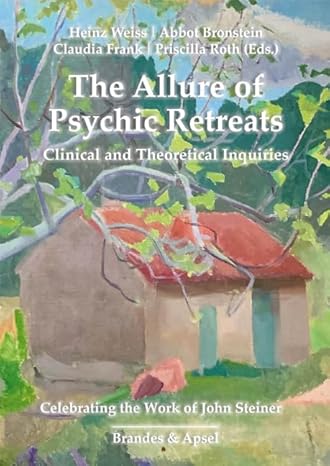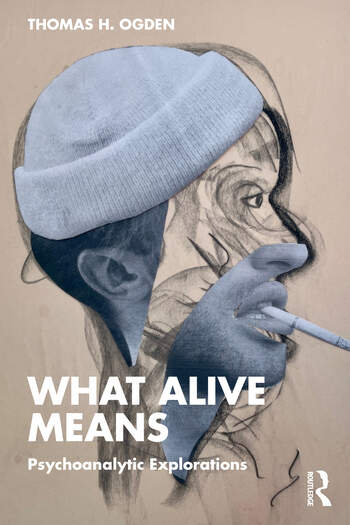The Petrified Ego: A New Theory of Conscience

Book Details
- Publisher : Routledge
- Published : October 2013
- Cover : Paperback
- Pages : 122
- Category :
Psychoanalysis - Catalogue No : 33574
- ISBN 13 : 9781780491783
- ISBN 10 : 1780491786
There are currently no reviews
Be the first to review
Due to the inherent contradiction in Freud’s concept of the Superego, there is a gap in our psychoanalytic understanding of how conscience evolves. This distinction is essential for the successful treatment of patients dominated by a harsh Superego and provides valuable insight into how contemporary society evaluates moral decisions.
The Petrified Ego argues for a revision of psychoanalytic theory to include instinct as the primary form of morality. It makes the case that our earliest, infantile notion of ‘good’ and ‘bad’ is rather founded on experiences which have been ‘safe or ‘threatening’. More often than not, this is the basis of our moral judgement of others. It is only through direct challenge to these visceral values that beliefs independent of the survival instinct can be forged.
Why does this matter? Lack of distinction between the two means that consideration of the ‘right or wrong’ or the ‘good or bad’ of others’ behaviour is no more than the rationalising of an instinctual response. To apply rationality is quite different to the act of rationalising.The author argues that weighty issues such as the right to work and to claim benefit, the judicial handling of rioting adolescents, prisoners’ right to vote, institutional ‘group think’ such as seen in the banking sector, care homes and even recently, the BBC, flounder for want of a sound framework around the origin and evolution of morality.
Contrary to the accepted view, the stability of society and the individuals who comprise it, is not a compromise between opposites but the articulation of a relationship between two entities of a different order: social and individual. An apparently well-structured organisation too often disguises a rigid moral order which represses individual perspective. Once rigidity is acknowledged to be the hallmark of a moral order founded on instinctual fear, it can be dissipated, allowing for the integration of individual experience, facilitating a mature and inclusive moral stance.
Reviews and Endorsements
'This book tackles the integration of distinct understandings of the origin and nature of conscience with clarity. Reddish believes we need a proper theory of moral development to help us distinguish between primitive "totemic" forms of moral thinking and a more mature morality based on becoming able to think for ourselves. Her "petrified" ego is an ego that fails to develop, kept imprisoned by an archaic morality arising from anxieties about survival. Her argument throws welcome light on the alarmingly simplified moralities and "moral panics" of much public discourse as well as on clinical issues. Here is a psychoanalytic "good read".'
- Margaret Rustin, child, adolescent, and adult psychotherapist, former Head of Child Psychotherapy at the Tavistock Clinic
'A fascinating contribution - and addition- to ideas about the development and nature of conscience.'
- Anne Alvarez, PhD, consultant child and adolescent psychotherapist
'Elizabeth Reddish sets out a compelling and rich account of a revised theory of the evolution and function of conscience. It is a compelling development in which she sees the roots of conscience in archaic instinctual responses to early anxieties around survival, pertaining to what feels safe and secure. This stage she says is an early precursor to the later moralistic judgements around right and wrong that we associate with the superego. It is a beautifully written account with clear clinical illustrations that provides a refreshing re-exploration of these concepts in a way that throws light into aspects of patients who might be difficult to reach, suggesting that it maybe our theories that require revision.'
- David Morgan, consultant psychotherapist, psychoanalyst BPAS, BPA
'The Petrified Ego is not only a scholarly, imaginative book on the relationship of the ego to the superego but it is also very timely. A reappraisal of this psychoanalytic concept is overdue. Elizabeth Reddish is right in her assertion that the superego is one of the most important contributions of psychoanalysis to an understanding of ordinary and extraordinary social life and individual behaviour. She is also right that the evolution of the concept in pscyhoanalytic theory is confused, confusing, and unresolved. Her analysis of the literature, and her own clinical observation that informs her view of the relation between a sense of reality and a sense of morality, is convincing and profound. The suggestion that under the sway of an archaic superego and totemic ego ideal a sense of reality and a belief in morality are initially identical because their edicts are believed to be necessary for survival is persuasive. And her account of how it is emancipation from this that leads to a functional ego capable of reality testing and therefore capable of pursuing the truth, is both convincing and also clinically and socially very important. Her emphasis on the separation of observation and valuation applied to the self, to others, and to the superego, is the basis of freedom of thought and an informed conscience. We all need to follow her exploration of this in theory and practice and to think hard about these things: I found the book very impressive.'
- Ronald Britton, former President of the British Psychoanalytical Society and author of Sex, Death, and the Superego
'From the moment Freud postulated the superego concept there has been debate about its validity and its scope in making explanations. However perhaps not enough debate: as this book shows, there are real problems to be exposed. At its simplest, commands of the superego might save you from dire social consequences – castration or worse. But is that morality? How do we place the ego-destructive superego in relation to a concern for others? How does punitive guilt work together with efforts to atone? This book brings together many of the criticisms of superego morality, in particular the pseudo-morality of social surviving. We are advised to separate a moral plane of thinking away from merely acquiescing to social norms. It is surprising that there has not been more debate on Reddish's area of interest. And so it is heartening to find a successful foray into this set of issues, one that is backed by success with a category of stuck patients displaying a certain constellation of psychodynamics.'
- R.D. Hinshelwood, Professor of Psychoanalysis at the Centre for Psychoanalytic Studies, University of Essex
‘It has been suggested that the idea of a Freudian superego is out of fashion and should now be disregarded. Dr Reddish rejects this view and provides us with a necessary review and critique of classical theory, with a valuable revision of her own. Her central concept is the early, primitive “archaic superego”, which she contrasts with the later Oedipal anxiety of Freudian theory. She argues that the healthy development of mature superego morality will depend crucially on the role of the ego in its negotiation with and challenge of the archaic superego. In the absence of this process the archaic superego dominates the personality and the ego becomes “petrified”. This may result in the individual becoming trapped in a mental prison and an immersion in a powerful, self-attacking, false-self morality. Psychopathological features may include self -destructive behaviour, extreme rigidity, and other features of severe disturbance. Dr. Reddish’s work is a rich and valuable contribution both to psychoanalytic theory and clinical practice and to social theory. She is to be congratulated on her efforts to clarify and build upon a very complex, but very significant area of human development.’
- Bernard Barnett, psychoanalyst and author of You Ought To! A Psychoanalytic Study of the Superego and Conscience
‘When Freud referred to the superego as the psychoanalytic equivalent of conscience, he temptingly implied that psychoanalysis offered a meeting-point between our social and individual natures. Morality lies at the heart of social existence, embedded in conscience, and now the complexities that had challenged philosophers, brought to a peak in Kant, could be resolved through a theory of the psyche. At the same time, his “equivalence” left a yawning gap between the psychoanalytic concept of superego, formed from the Oedipus complex, and the philosophical and sociological concept of conscience, grounded in moral absolutes of right and wrong. Elizabeth Reddish jumps right into the centre of this gap, and far from free-fall into it, she retrieves the superego from its weakened status in psychoanalysis and shows how it links to the archaic need to survive, and from there to a proper concept of morality rather than survival anxiety. In doing so, she brings clarity to our ideas of morality, which in fact often conceal survival anxiety, and to the entrenched sufferings seen in many patients. She joins scholarship with clinical acumen, and her book will engage readers with sociological, philosophical, and clinical interests.’
- Karl Figlio, Professor, Centre for Psychoanalytic Studies, University of Essex
About the Author(s)
Elizabeth Reddish has worked as a psychoanalytic psychotherapist in London since 1996 and is registered with the British Psychoanalytic Council. The Petrified Ego is adapted from her professional doctorate ‘The Structuring Function of the Superego’. She worked for fifteen years in the feature film industry prior to training in psychoanalysis. Her clinical experience of the debilitating impact of an over-critical conscience forms the basis of a psychoanalytic model that she has designed to help individuals fulfil their potential at work. She consults in this area alongside her clinical practice.
Customer Reviews
Our customers have not yet reviewed this title. Be the first add your own review for this title.
You may also like
Dissecting the Superego: Moralities Under the Psychoanalytic Microscope
Celia Harding
Price £33.11
save £2.88
The Allure of Psychic Retreats: Clinical and Theoretical Inquiries
Heinz Weiss
Price £30.59
save £3.40







